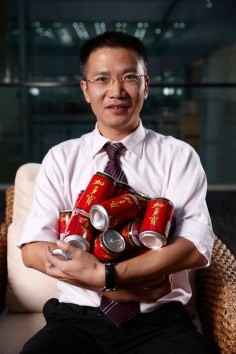
Herbal drink giant's recipe for home-grown success
With its focus on its only product initially, JDB's red-canned beverage has become so popular that the company is dubbed 'China's Coca-Cola'
Leading mainland beverage maker JDB Group has been dubbed "China's Coca-Cola" because of its business model, which is similar to that of the American giant, and its huge success in its home market.

"Coca-Cola is our role model," said Wang Yuegui, a deputy general manager of JDB's brand management department. "Our goal is to build a world-class beverage brand originating in China."
JDB, formerly known as Guangdong Jiaduobao Drink & Food, was founded by Hong Kong businessman Chan Hung-to in Guangzhou in 1995 after he acquired the licensing rights to Wong Lo Kat, a herbal tea brand established in Guangzhou more than 150 years ago.
The herbal tea is popular in southern China. It is made from herbs and is believed to be able to lower internal heat and relieve inflammation.
With a sharp business sense, Chan positioned Wong Lo Kat as a healthy, mass market soft drink and packaged it in eye-catching red aluminium cans emblazoned with bold golden Chinese characters.
The company also built large production lines and established a widespread sales network through supermarkets, grocery stores and restaurants in Guangdong.
The efforts paid off as annual sales of Wong Lo Kat grew rapidly to reach 100 million yuan in 2000.
From 2003, the company started to expand beyond Guangdong. It built plants in Beijing, Zhejiang and Fujian, and invested heavily in mar- keting and television advertis- ing, making the sweet-tasting beverage known across the country.
Sales shot up to 600 million yuan in 2003.
Four years later, JDB surpassed Coca-Cola as the biggest seller of canned drinks on the mainland, with annual sales of 17 billion yuan, according to statistics from the China Industrial Information Issuing Centre.
The company moved its headquarters from Guangdong to Beijing in 2008.
Our ultimate goal is to create a world-class brand … first we must overtake Coca-Cola
After running with a single product for more than a decade, JDB launched its second drink, Kunlun Mountain - high-end bottled mineral water - in 2009.
JDB faced its most severe challenge in April 2011, when state-owned Guangzhou Pharmaceutical, the holder of the Wong Lo Kat brand, applied to the China International Economic and Trade Arbitration Commission to terminate JDB's right to use the Wong Lo Kat trademark.
It argued that the licensing contracts signed by its former general manager, Li Yimin, had been influenced by bribes from JDB and were therefore invalid.
Li, who had agreed to extend JDB's licensing rights to Wong Lo Kat to 2020, was jailed in 2005 for taking bribes, including HK$3 million from JDB.
The commission ruled in May last year that the licensing extension contracts were invalid and Guangzhou Pharmaceutical took back the trademark and started to produce its own red-canned Wong Lo Kat herbal tea as a rival to JDB's product, which was renamed Jiaduobao.
While some thought the loss of the trademark would hurt JDB, it retained its market position.
In summer last year, JDB spent 60 million yuan to sponsor Zhejiang TV's singing contest, , which became a national hit. The programme gave the brand name a significant boost and the company sponsored the programme again this year for about 200 million yuan.
Last year, JDB had sales of more than 20 billion yuan, capturing more than 70 per cent of the herbal tea market.
Meanwhile, the fight between JDB and Guangzhou Pharmaceutical escalated, with the two companies bringing a series of lawsuits against each other over the past 15 months, centring on advertising and brand image.

For a big company like us, the temptation [to launch more products] is really high. With an existing distribution network and brand influence, it is easy for us to earn an additional one billion or two billion yuan a year with a new brand.
However, this would surely distract our attention, capital and resources. It may be able to build a big business but not a strong one. We do not want to be a product-driven company but a brand-driven one.
For years, we were only running a single brand. It gave us a very clear direction.
We are the title sponsor for a popular television show, , this and last summer. What we have done is far more than simply giving money. We are actually very much involved in the whole process.
At our Beijing office, we have at least 10 employees dedicated to spreading messages and news about the programme through our social media platforms and website before it is aired every Friday. Our messages have attracted millions of viewers.
Our bottled water business is still making losses. It is still at the early stage of development. But we believe it will have a bigger market than herbal tea, since water is a necessity for everyone. As consumers are more health-conscious, more of them will accept our products.
We would not rule out the possibility of launching new products. But we do not have such plans now.
Coca-Cola is the most respectable company in our eyes. Geographically, it has a much more balanced presence than us on the mainland. This is the biggest gap between us. We have been focusing on the southern market and we need to expand in the north.
So far, our sales are about 60 to 70 per cent of Coca-Cola's on the mainland. We need to go deeper into the market, which means expanding to smaller cities and rural areas, especially in the north, and raising customers' repeat purchase rate.
Our ultimate goal is to create a world-class brand. But first, we must overtake Coca-Cola not only in terms of sales, but also in popularity and brand image.
